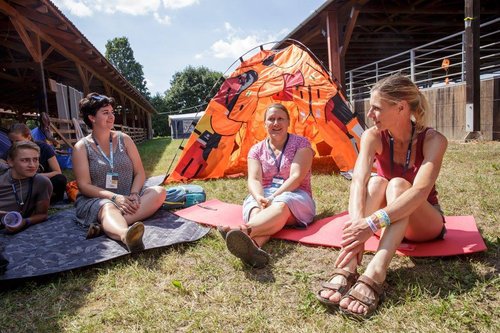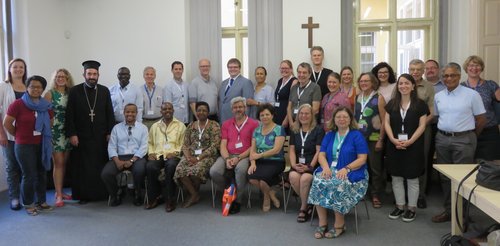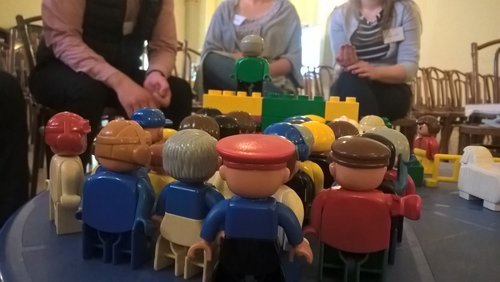In February 2017, the RCH and Swiss Church Aid (HEKS/EPER) cooperated on a Country Program for Hungary, making refugee integration one of the main priorities. As the school year begins, the HEKS/EPER-funded project is in full swing, helping children at an after-school program and sensitizing the wider church about issues surrounding human migration.
After months of dedicated work throughout 2016 and 2017, a new Country Program (CP) between the RCH and Swiss Church Aid (HEKS/EPER) was realized. The thematic focus of the CP, running from 2017-2020, is refugee and Roma integration. The HEKS/EPER Board of Directors was particularly impressed with the focus on disadvantaged groups and the efforts planned by the RCH to improve relationships between majority society and refugees/Roma. The project for the promotion of integration of refugees and migrants focuses on the sensitization of the church constituency and involves congregations in an after school tutoring program for refugee children and youth.
The RCH, through its newly established Unit for Refugee Integration in the Diaconal Office, is working with Kalunba Social Services Association Ltd as the official implementing partner for the project. Kalunba has been working with refugees since 2014 and many of the staff there has ties to the RCH, making it a wonderful fit to carry out this work on a local level.
The after school tutoring program has continued as summer turns into fall and things become more structured again for the youth who have started school. Students and mentors meet throughout the week to work on homework, study languages, and socialize. Social workers meet with the children in the program first, working with them one-on-one to determine the best ways to teach them and create an individualized program of study. When this is done, kids are carefully matched with volunteers, some from local RCH churches in Budapest, to help them reach their educational goals, with social workers available as extra support along the way. In the 2016-2017 school year, 37 children were enrolled in the after school activities, and it looks like even more will join for the 2017-2018 school season. The children come from around the world, including Syria, Algeria, Afghanistan, Ethiopia, Congo, and Cameroon.

The sensitization project has begun as well, with a big kickoff at the Starpoint reformed youth festival this summer. The RCH’s Unit for Refugee Integration and Kalunba were well represented there, talking to youth about human migration, refugees, and how they can help. Young people gathered at their tent to do henna and have a chat about this timely social issue. Kalunba also organized a simulation game called “Passages,” designed by the UNHCR, which was played on two nights with festival attendees – it sparked lively and informative discussion.
The sensitization project is poised to continue and take on many forms as fall begins, with plans to help shift the attitude of the broader population “from fear to compassion” and also help churches contribute to an alternative narrative about refugees into the public discourse. This will be done in a variety of ways, including through congregational visits, study trips to learn best practices about working with refugees, and facilitating education on this topic during mission conferences and continuing education for religious professionals.
New colleagues have been hired to meet the goals of the new CP, including Ágnes Székely, the Refugee Coordinator at the RCH Diaconal Office’s Unit for Refugee Integration, and new teachers at Kalunba. The new staff members at the DO and at Kalunba are contributing greatly to make sure that the CP is a success.

Partly through exchange and study trips, partly through attending international conferences in Budapest, and partly through accepting a wide range of international visitors, the RCH and the Diaconal Office have been gaining additional ideas from other countries as to best practices in refugee work. Kalunba and the RCH’s Unit for Refugee Integration were well-represented at the CCME General Assembly in Prague. Dora Kanizsai-Nagy, the RCH Diaconal Office’s Head of the Unit for Refugee Integration and co-founder of Kalunba, participated in the conference as an expert on a panel related to integrating refugees in a difficult environment. In addition, eight staff and volunteers from Kalunba made the trip to Prague to take part in the conference and also support Kalunba’s CEO, Balázs Acsai, as the non-profit was officially recognized by CCME as a member organization during the first day of the General Assembly. Three exceptionally interesting international conferences were also attended by the Refugee Coordinator at the DO’s Unit for Refugee Integration.

In addition, Kalunba volunteers were also invited to attend a seminar on "Escape, Migration and Challenge", held by Martina Wasserloos-Strunk, German political scientist, member of the Task Force on Migration and Refugee of the European Area of the World Communion of Reformed Churches. The one-day event provided a supportive environment for first-time volunteers to learn about the challenges and opportunities in working with refugees. Through these experiences, leadership, staff, and volunteers at the DO and Kalunba have been expanding their knowledge and gaining more experience in best practices for refugee work.
The CP focuses on the promotion of integration of refugees and migrants through the sensitization of the wider church constituency and an expanded after school tutoring program for refugee children, and both have seen promising initial success. The teams at the DO and at Kalunba are off to a strong start, working hard to discuss these important issues with people in Hungary and on a wider European level. They hope that the coming years will bring continued success to the HEKS/EPER funded Country Program.
Article by Kearstin Bailey
Photos via reformatus.hu and CCME